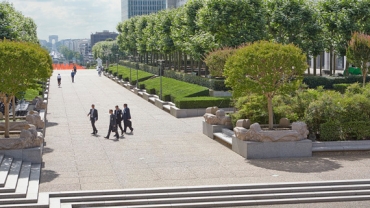
Industry
Retail & consumer
Our role
Full guidance major acquisition
Result
Successful integration
In April of this year, Roompot received the green light from the Dutch Authority Consumer & Market (ACM) to take over Landal GreenParks. For Sebastiaan van der Welle, senior director finance at Roompot, the challenge now lies in ‘integrating two different strands of DNA into a single organisation.’ The story of a large takeover and the comprehensive support role provided by PwC at all stages of the process.
A great deal of preparatory work was involved in the acquisition of Landal GreenParks, starting back in 2021 when Roompot first decided to buy the company and contacted PwC. ‘We carried out the due diligence for Roompot,’ says Gijs van Leeuwen, partner in Deals at PwC. ‘Once the purchase contract was signed all that was left was to wait for approval by the ACM. In the meantime, PwC helped Roompot gather the financing, provided support in the approval process by ACM with market and economic research, and helped make a start with preparations for the possible merger of both organisations.’
With regards to the approval project, Van der Welle welcomed the support offered in mapping out the market. ‘What is your market share? Are there issues and, if so, how do you deal with them? PwC’s data analyst team helped us share our market view with the ACM.’
The takeover process
One of the provisions ACM set for Roompot to take over Landal GreenParks was to sell thirty vacation parks. ‘Although we hadn’t really expected this sale, together with PwC we carefully went through all steps of the process,’ says Van der Welle. ‘Various PwC teams supported the sale of the thirty parks, including with due diligence, offering specialised assistance
Van Leeuwen was responsible for the due diligence of the thirty parks: ‘To provide potential buyers with financial information, Roompot asked us to make a vendor due diligence report. And that entailed analysing the numbers for each park.’
Joint business structure
With the takeover now complete, Van der Welle continues to receive support from different PwC teams with the process of integrating Landal GreenParks and Roompot. A vital part of this work is the development of a joint business structure. ‘Workshops and interviews set up by PwC have helped us in the thinking process. How do we manage the new organisation that annually processes 25 million overnight stays? What about the hierarchy?’
In addition to process matters, Roompot has also been hard at work on the IT side since the merger and sale. The sold parks are de-merged and eventually the systems of the two companies will be consolidated. ‘That’s a complex job for any IT department’, Van der Welle explains.
Diverse team disciplines
Having previously worked for a long time at PwC himself, Van der Welle knew the culture and people very well. ‘It feels like a warm bath to cooperate with the different PwC teams. I’ve seen people work in many different disciplines that I didn’t even know existed until now!’
Van der Welle also appreciates the critical questions the PwC teams kept asking during the process. ‘There is no information available about the size of the Dutch vacation market, for instance, so a data team immediately decided to explore this issue. All park websites were studied and cadastral data requested. The team finally managed to dig up the missing data set.’
‘It has been a fine experience for us to be involved with such a large and transformational transaction,’ says Van Leeuwen. ‘We had to deal with so many takeover aspects that you don’t see on every transaction, including the ACM economic analyses carried out by two PwC partners.’
Stronger together
How does Van der Welle now see the growth ambitions of Roompot after the takeover? ‘These revolve around the integration of the two different strands of corporate DNA. With this Van der Welle refers to Roompot’s roots in the family business from the Dutch province of Zeeland, and Landal was part of an American concern. Our aim is to create the very best from these two different cultures and procedures. We don’t see the merger as a takeover. It is a fusion of two distinctive worlds.’


















